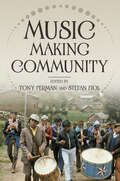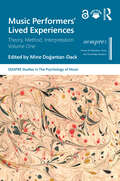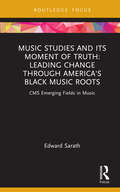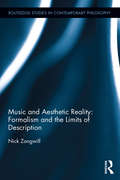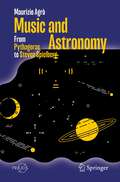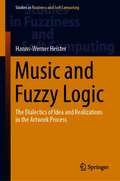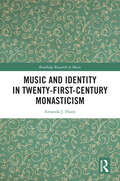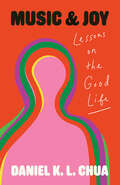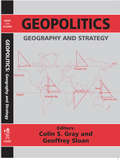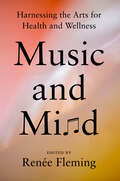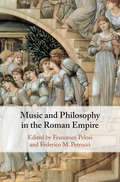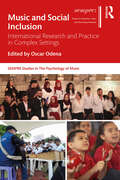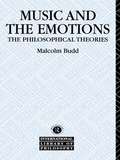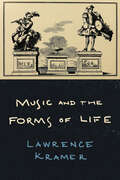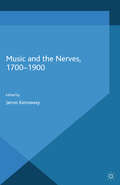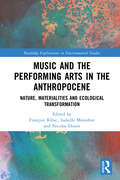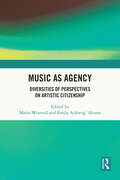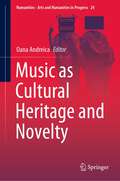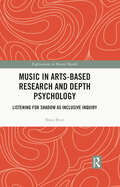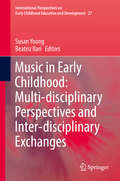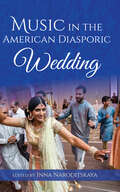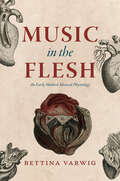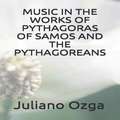- Table View
- List View
Music Making Community
by Bruno Nettl Joanna Bosse Stefan Fiol Stephen Blum Veit Erlmann Eduardo Herrera Ioannis Tsekouras Donna A Buchanan Thomas Solomon Sylvia Bruinders David A McDonald Rick DejaMaking music offers enormous possibilities--and faces significant limitations--in its power to generate belonging and advance social justice. Tony Perman and Stefan Fiol edit essays focused on the forms of interplay between music-making and community-making as mutually creative processes. Contributors in the first section look at cases where music arrived in settings with little or no sense of community and formed social bonds that lasted beyond its departure. In the sections that follow, the essayists turn to stable communities that used musical forms to address social needs and both forged new social groups and, in some cases, splintered established communities. By centering the value of difference in productive feedback dynamics of music and community while asserting the need for mutual moral indebtedness, they foreground music’s potential to transform community for the better. Contributors: Stephen Blum, Joanna Bosse, Sylvia Bruinders, Donna A. Buchanan, Rick Deja, Veit Erlmann, Stefan Fiol, Eduardo Herrera, David A. McDonald, Tony Perman, Thomas Solomon, and Ioannis Tsekouras
Music Performers' Lived Experiences: Theory, Method, Interpretation: Volume One (SEMPRE Studies in The Psychology of Music)
by Edited by Mine Doğantan-DackThe two volumes on Music Performers’ Lived Experiences seeks to widen this research area through close investigations of a variety of rich, complex and nuanced experiences classical music performers have qua performers, as they interact with musical scores, instruments, performance traditions, other musicking individuals, wider artistic and cultural discourses, norms and beliefs.The two volumes aim to “humanise” music performers and contribute towards shaping a more performer-centred discipline of Music Performance Studies. The first volume, Music Performers’ Lived Experiences: Theory, Method, Interpretation, brings together internationally renowned scholars, who capture and scrutinise, through a variety of methods, a wide range of experiences performers have—as well as the personally meaningful lived experience narratives performers construct—presenting vivid portraits of music performers as artists situated in unique socio-cultural, historical, embodied and discursive contexts. The topics discussed include the construction of the idea of “the composer” from lived experiences of performing, manifestations of wisdom in the ways performers make sense of their experiences, joys of sight-reading, performer agency, lived experience as the basis of performance analysis, emotional labour of working with controversial repertoire, performance anxiety dreams of music performers, experience of working across musical genres, the nature of intersubjective experiences in music-making, absorption, and subjective bodily sensations in performance.Readers will come away from the book with fresh insights about and an enhanced understanding of the infinitely rich lifeworld of music performers.
Music Studies and Its Moment of Truth: CMS Emerging Fields in Music (CMS Emerging Fields in Music)
by Edward SarathMusic Studies and Its Moment of Truth: Leading Change through America’s Black Music Roots presents a new framework for racial justice discourse in the context of music studies and education. Centering on Black American Music, the book issues challenges to both the conventional music studies paradigm and decades-old reform efforts. While Black American Music ranks high among America’s contributions to world culture, and offers musicians powerful tools for musical practice and understanding, this musical legacy remains remarkably marginalized even in activist conversations. The author argues that this reflects lingering and unexamined racist patterns that persist even among the most fervent voices for anti-racist interventions, and addresses the need for a higher-order activist framework within music studies. Delving further into the transformative changes needed to pursue racial justice, the short pieces collected in this book discuss topics including a shift from multicultural ideology to a transcultural model of musical pluralism, analysis of the multi-tiered nature of musical racism, the whitewashing of music studies activism, K-12 music teacher education as the locus for paradigmatic change and the potential for a transformed model of music studies to catalyze an overarching revolution in creativity and consciousness in both education and society at large. Critiquing the failures of progressive reform efforts and conventional reaction, this book argues that major changes are needed to the discourse on racism in music studies, and envisions new paradigms for the future.
Music Studies and Its Moment of Truth: CMS Emerging Fields in Music (CMS Emerging Fields in Music)
by Edward SarathMusic Studies and Its Moment of Truth: Leading Change through America’s Black Music Roots presents a new framework for racial justice discourse in the context of music studies and education. Centering on Black American Music, the book issues challenges to both the conventional music studies paradigm and decades-old reform efforts.While Black American Music ranks high among America’s contributions to world culture, and offers musicians powerful tools for musical practice and understanding, this musical legacy remains remarkably marginalized even in activist conversations. The author argues that this reflects lingering and unexamined racist patterns that persist even among the most fervent voices for anti-racist interventions, and addresses the need for a higher-order activist framework within music studies.Delving further into the transformative changes needed to pursue racial justice, the short pieces collected in this book discuss topics including a shift from multicultural ideology to a transcultural model of musical pluralism, analysis of the multi-tiered nature of musical racism, the whitewashing of music studies activism, K-12 music teacher education as the locus for paradigmatic change and the potential for a transformed model of music studies to catalyze an overarching revolution in creativity and consciousness in both education and society at large. Critiquing the failures of progressive reform efforts and conventional reaction, this book argues that major changes are needed to the discourse on racism in music studies, and envisions new paradigms for the future.
Music and Aesthetic Reality: Formalism and the Limits of Description (Routledge Studies in Contemporary Philosophy)
by Nick ZangwillIn this volume, Zangwill develops a view of the nature of music and our experience of music that foregrounds the aesthetic properties of music. He focuses on metaphysical issues about aesthetic properties of music, psychological issues about the nature of musical experience, and philosophy of language issues about the metaphorical nature of aesthetic descriptions of music. Among the innovations of this book, Zangwill addresses the limits of literal description, generally, and in the aesthetic case. He also explores the social and political issues about musical listening, which tend to be addressed more in continental traditions.
Music and Astronomy: From Pythagoras to Steven Spielberg (Springer Praxis Books)
by Maurizio AgròThis book explores the profound and ancient relationship between music and astronomy. Throughout history, Music has occupied a significant place among the disciplines of the Quadrivium, which also include Geometry, Arithmetic, and Astronomy. The captivating bond between these two realms has not only inspired eminent scientists like Kepler, Newton, and Einstein, but has also captured the imagination of NASA and astronauts in modern times. The author delves into various aspects of the intersection between music and astronomy, encompassing everything from ancient cosmological beliefs to groundbreaking discoveries such as the cosmic background radiation and gravitational waves. This enthralling theme has not only stimulated renowned artists like David Bowie and Elton John, but has also served as a muse for movies like Close Encounters of the Third Kind. Within the book, readers will find an extensive photo gallery and a specially curated soundtrack that enhances the reading experience. It caters to a broad audience, appealing to those with a general interest in both music and astronomy, as well as to specialized individuals in either field of study.
Music and Fuzzy Logic: The Dialectics of Idea and Realizations in the Artwork Process (Studies in Fuzziness and Soft Computing #406)
by Hanns-Werner HeisterThis book unfolds the manifold, complex and intertwined relations between Fuzzy Logic and music in a first comprehensive overview on this topic: systematically as an outline, as completely as possible, in the aspects of Fuzzy Logic in this relation, and especially in music as a process with three main phases, five anthropological layers, and thirteen forms of existence of the art work (Classics, Jazz, Pop, Folklore). Being concerned with the ontological, gnoseological, psychological, and (music-) aesthetical status and the relative importance of different phenomena of relationship between music and Fuzzy Logic, the explication follows the four main principles (with five phenotypes) of Fuzzy Logic with respect to music: similarity, sharpening 1 as filtering, sharpening 2 as crystallization, blurring, and variation. The book reports on years of author’s research on topics that have been only little explored so far in the area of Music and Fuzzy Logic. It merges concepts of music analysis with fuzzy logical modes of thinking, in a unique way that is expected to attract both specialists of music and specialists of Fuzzy Logic, and also non-specialists in both fields. The book introduces the concept of dialectic between sharpening and – conscious – “blurring”. In turn, some important aspects of this dialectic are discussed, placing them in an historical dimension, and ending in the postulation of a 'musical turn' in the sciences, with some important reflections concerning a “Philosophy of Fuzzy Logic”. Moreover, a production-oriented thinking is borrowed from fuzzy logic to musicology in this book, opening new perspectives in music, and possibly also in other artistic fields.
Music and Identity in Twenty-First-Century Monasticism (Routledge Research in Music)
by Amanda J. HasteTwenty-first-century monastic communities represent unique social environments in which music plays an integral part. This book examines the role of music in Catholic, Anglican/Episcopalian and neo-monastic communities in Britain and North America, engaging closely with communities of practice to provide a penetrating insight into the role of music in self-care and as a vector for identity construction on both individual and community levels. The author explores the essential role of music in community dynamics, the rationale for using instruments, the implications of both chant-based and freestyle composition, gender-related differences in musical activity, the role of dance (‘music made visible’) in community life, the commodification of monastic music, the ‘Singing Nun’ phenomenon and the role of music in established and emerging neo-monastic communities. The result is a comprehensive and compelling study of the agency of music in the construction and expression of personal and community identity.
Music and Joy: Lessons on the Good Life
by Daniel K. ChuaFrom Confucius to Saint Augustine and Beethoven to the blues, a rediscovery of the joy that is music In this revelatory book, Daniel K. L. Chua asks a simple question: Is music joy? For Chua, the answer is a resounding yes—music is a lesson in joy that teaches us how to live well. But to hear this ancient knowledge, he says, we have to attend to a music that is so much greater than our greatest hits. Drawing on extensive sources, from the Confucian classics to the writings of Saint Augustine, Chua&’s book is a globe‑trotting, time‑traveling, mind‑boggling journey to rediscover the joy that is music. Using examples from Beethoven to the blues and from philosophy and theology to music theory, Chua updates the relation between music and joy and argues for its relevance in the face of our many political and environmental crises. He opens our ears to a music that is the very definition of joy for today&’s troubled world.
Music and Marx: Ideas, Practice, Politics (Critical and Cultural Musicology)
by Regula Burckhardt QureshiFirst Published in 2002. Routledge is an imprint of Taylor & Francis, an informa company.
Music and Mind: Harnessing the Arts for Health and Wellness
by Edited by Renée Fleming"This book inspires us all to immerse ourselves in the vast potential of music and other creative arts to heal our wounds, sharpen our minds, enliven our bodies, and restore our broken connections.&” —Bessel van der Kolk, #1 New York Times bestselling author of The Body Keeps the ScoreWorld-renowned soprano and arts/health advocate Renée Fleming curates a collection of essays from leading scientists, artists, creative arts therapists, educators, and healthcare providers about the powerful impacts of music and the arts on health and the human experienceChapters include: Ann Patchett, &“How to Fall in Love with Opera&” Yo-Yo Ma, &“Nature, Culture, and Healing&”Aniruddh D. Patel, &“Musicality, Evolution, and Animal Responses to Music&”Richard Powers, &“The Parting Glass"Daniel J. Levitin, &“What Does It Mean to be Musical?&” Anna Deavere Smith, &“Healing Arts&” Rosanne Cash, &“Rabbit Hole&” Rhiannon Giddens, &“How Music Shows Us What It Means to Be Human&”Robert Zatorre, &“Musical Enjoyment and the Reward Circuits of the Brain&”Concetta Tomaino, &“Music and Memory&”A compelling and growing body of research has shown music and arts therapies to be effective tools for addressing a widening array of conditions, from providing pain relief andalleviating anxiety and depression to regaining speech after stroke or traumatic brain injury, and improving mobility for people with disorders that include Parkinson&’s disease and MS.In Music and Mind Renée Fleming draws upon her own experience as an advocate to showcase the breadth of this booming field, inviting leading experts to share their discoveries. In addition to describing therapeutic benefits, the book explores evolution, brain function, childhood development, and technology as applied to arts and health.Much of this area of study is relatively new, made possible by recent advances in brain imaging, and supported by theNational Institutes of Health, major hospitals, and universities. This work is sparking an explosion of public interest in the arts and health sector.Fleming has presented on this material in over fifty cities across North America, Europe, and Asia, collaborating with leading researchers, policy-makers, and practitioners. With essays from notable musicians, writers, and artists, as well as leading neuroscientists, Music and Mind is a groundbreaking book, the perfect introduction and overview of this exciting new field.
Music and Philosophy in the Roman Empire
by Francesco Pelosi Federico M. PetrucciIs music just matter of hearing and producing notes? And is it of interest just to musicians? By exploring different authors and philosophical trends of the Roman Empire, from Philo of Alexandria to Alexander of Aphrodisias, from the rebirth of Platonism with Plutarch to the last Neoplatonists, this book sheds light on different ways in which music and musical notions were made a crucial part of philosophical discourse. Far from being mere metaphors, notions such as harmony, concord and attunement became key philosophical tools in order to better grasp and conceptualise fundamental notions in philosophical debates from cosmology to ethics and from epistemology to theology. The volume is written by a distinguished international team of contributors.
Music and Social Inclusion: International Research and Practice in Complex Settings (SEMPRE Studies in The Psychology of Music)
by Oscar OdenaHow do we develop social inclusion through musical activities? What is the power of music in enhancing individual inclusion, group cohesion, and cross-community work in post-conflict environments? How can we investigate social music programmes and interventions? This comprehensive volume offers new research on these questions by an international team of experts from the fields of music education, music psychology, ethnomusicology, and community music. The book celebrates the rich diversity of ways in which learners of all ages participate in social music projects in complex settings. Contributions focus broadly on musical and social processes, considering its conceptualisation and practices in a number of contexts. The authors examine how social music projects can be fostered in complex settings, drawing examples from schools and community settings. These critical chapters will inspire readers to think deeply about social music interventions and their development. The book will be of crucial interest to educators, policymakers, researchers, and students, as it draws on applied research from across 14 countries, of which ten are in the Global South.
Music and the Emotions: The Philosophical Theories (International Library of Philosophy)
by Malcolm BuddIt has often been claimed, and frequently denied, that music derives some or all of its artistic value from the relation in which it stands to the emotions. This book presents and subjects to critical examination the chief theories about the relationship between the art of music and the emotions.
Music and the Forms of Life
by Lawrence KramerInventors in the age of the Enlightenment created lifelike androids capable of playing music on real instruments. Music and the Forms of Life examines the link between such simulated life and music, which began in the era's scientific literature and extended into a series of famous musical works by Haydn, Mozart, and Beethoven. Music invented auditory metaphors for the scientific elements of life (drive, pulse, sensibility, irritability, even metabolism), investigated the affinities and antagonisms between life and mechanism, and explored questions of whether and how mechanisms can come to life. The resulting changes in the conceptions of both life and music had wide cultural resonance at the time, and those concepts continued to evolve long after. A critical part of that evolution was a nineteenth-century shift in focus from moving androids to the projection of life in motion, culminating in the invention of cinema. Weaving together cultural and musical practices, Lawrence Kramer traces these developments through a collection of case studies ranging from classical symphonies to modernist projections of waltzing specters by Mahler and Ravel to a novel linking Bach's Goldberg Variations to the genetic code.
Music and the Nerves, 1700-1900
by James KennawayThe relationship between music and the nervous system is now the subject of intense interest for scientists and people in the humanities, but this is by no means a new phenomenon. This volume sets out the history of the relationship between neurology and music, putting the advances of our era into context.
Music and the Performing Arts in the Anthropocene: Nature, Materialities and Ecological Transformation (Routledge Explorations in Environmental Studies)
by François Ribac Isabelle Moindrot Nicolas DoninMusic and the Performing Arts in the Anthropocene offers a series of thought-provoking chapters about music and the performing arts viewed from current Anthropocene-aware perspectives. From the use of gas, water and air in 19th-century stage practices to the ecology of musical instruments and sound reproduction technologies, waste and carbon print in experimental music and theatrical production, knowledge of precariousness and empowerment through music in a changing world, each chapter aims at highlighting an issue that has always been here but never looked at thoroughly, due to the divides and hierarchies of the modern cosmogony.Gathering 16 scholars from a variety of disciplinary backgrounds (history of literature, opera and theatre studies, musicology, sound studies, sociology, information science, etc.), this volume reflects on the relationships between the performing arts, music and environmental issues. It also explores a number of tools for changes and sketches how we will understand the arts, their history and their future beyond ecocriticism.This book will be of great interest to students and scholars in the humanities and social sciences, as well as a broader readership involved in art and environment policies.
Music as Agency: Diversities of Perspectives on Artistic Citizenship
by Emily Achieng’ Akuno Maria WestvallMusic as Agency: Diversities of Perspectives on Artistic Citizenship focuses on the concept, application, interpretation and manifestation of Artistic Citizenship in diverse contexts. The key concepts that the book tackles are: Cultural experience, artistic practice, musical identities, equity, democracy, community, activism, resistance and empathy.In giving an overview of aspects of the compound concept of artistic citizenship, Akuno and Westvall present the outcome of research and interrogation of practice by a global network of educator-researchers from Africa, the Americas, Asia and Europe. The book articulates notions of artistic citizenship, coming up with the term artizenship as a derivative of the composite term. It further explains and analyses practical ways of perceiving and relating to art spaces, art practices and arts objects towards belonging, being and becoming in a global space that is disparate, polarised and often alienating, and thus responding to issues such as social justice, identity, participation and inclusion. With a focus on music, the book targets musicians, scholars, educators and enthusiasts keen on gaining a deeper understanding of how music and musicking can influence human interactions towards social integration, trust, cultural awareness and intercultural understanding.
Music as Cultural Heritage and Novelty (Numanities - Arts and Humanities in Progress #24)
by Oana AndreicaThis book provides a multifaceted view on the relation between the old and the new in music, between tradition and innovation. This is a much-debated issue, generating various ideas and theories, which rarely come to unanimous conclusions. Therefore, the book offers diverse perspectives on topics such as national identities, narrative strategies, the question of musical performance and musical meaning. Alongside themes of general interest, such as classical repertoire, the music of well-established composers and musical topics, the chapters of the book also touch on specific, but equally interesting subjects, like Brazilian traditions, Serbian and Romanian composers and the lullaby. While the book is mostly addressed to researchers, it can also be recommended to students in musicology, ethnomusicology, musical performance, and musical semiotics.
Music in Arts-Based Research and Depth Psychology: Listening for Shadow as Inclusive Inquiry (ISSN)
by Shara BrunThis book addresses an existing gap in academic arts-based research, whereby, rather than exploring music as an effective therapeutic intervention, it is explored as the central medium or tool of inquiry.Integrating heuristic, hermeneutic, and arts-based grounded theory methodologies, the book conceptualizes and describes the practice of Sonic Stretching as an in-depth example of using sound as an effective and systematic research tool. Stemming from evidence-based insights, the book explores and explains ways in which music and sound can be utilized in arts-based research (ABR) in all disciplines, as opposed to only being used among professional musicians and those operating within music studies. It points to some of the obstacles that have previously prevented this from happening more broadly and, in doing so, aims to help bridge the conspicuous gap in ABR studies, where music and sonic imagination should be.Offering a clear and well-presented example for integrating music and sound into processes of depth psychological inquiry and addressing the impact of colonialization upon embodied knowledge in music and academic research, it will appeal to scholars and researchers working at the intersection of psychology, music studies, education, social justice, and research methods.
Music in Early Childhood: Multi-disciplinary Perspectives And Inter-disciplinary Exchanges (International Perspectives on Early Childhood Education and Development #27)
by Susan Young Beatriz IlariThis book examines four main areas of music in early childhood: the traditions of music for young children, their capacities for music, the way they make music with others, and constructed and mediated musical childhoods. It studies several themes in detail, including music making in the home and family life, various musical experiences in schools, day cares, and the community at large in several locations around the globe. It looks at technology and diverse musical repertoires, as well as innovative pedagogies, children’s agency, and brain research. Expanding on the knowledge bases on which early childhood music education typically draws, the book brings together contributions from a range of authors from diverse fields such as education, psychology, sociology, cultural studies, anthropology, philosophy, ethnomusicology, and the neurosciences. The end result is a volume that offers a broad and contemporary picture of music in early childhood.
Music in the American Diasporic Wedding
by Edited by Inna NaroditskayaWith real-life stories, this collection “focuses on the role of music in the often-delicate negotiations surrounding weddings in immigrant communities” (Ellen Koskoff, author of A Feminist Ethnomusicology).Music in the American Diasporic Wedding explores the complex cultural adaptations, preservations, and fusions that occur in weddings between couples and families of diverse origins. Discussing weddings as a site of negotiations between generations, traditions, and religions, the essays gathered here argue that music is the mediating force between the young and the old, ritual and entertainment, and immigrant lore and assimilation.The contributors examine such colorful integrations as klezmer-tinged Mandarin tunes at a Jewish and Taiwanese American wedding, a wedding services industry in Chicago’s South Asian community featuring a diversity of wedding music options, and Puerto Rican cultural activists dancing down the aisles of New York’s St. Cecilia’s church to the thunder of drums and maracas and rapping their marriage vows. These essays show us what wedding music and performance tell us about complex multiethnic diasporic identities, and remind us that how we listen to and celebrate otherness defines who we are.
Music in the American Diasporic Wedding
by Edited by Inna NaroditskayaWith real-life stories, this collection “focuses on the role of music in the often-delicate negotiations surrounding weddings in immigrant communities” (Ellen Koskoff, author of A Feminist Ethnomusicology).Music in the American Diasporic Wedding explores the complex cultural adaptations, preservations, and fusions that occur in weddings between couples and families of diverse origins. Discussing weddings as a site of negotiations between generations, traditions, and religions, the essays gathered here argue that music is the mediating force between the young and the old, ritual and entertainment, and immigrant lore and assimilation.The contributors examine such colorful integrations as klezmer-tinged Mandarin tunes at a Jewish and Taiwanese American wedding, a wedding services industry in Chicago’s South Asian community featuring a diversity of wedding music options, and Puerto Rican cultural activists dancing down the aisles of New York’s St. Cecilia’s church to the thunder of drums and maracas and rapping their marriage vows. These essays show us what wedding music and performance tell us about complex multiethnic diasporic identities, and remind us that how we listen to and celebrate otherness defines who we are.
Music in the Flesh: An Early Modern Musical Physiology (New Material Histories of Music)
by Bettina VarwigA corporeal history of music-making in early modern Europe. Music in the Flesh reimagines the lived experiences of music-making subjects—composers, performers, listeners—in the long seventeenth century. There are countless historical testimonies of the powerful effects of music upon the early modern body; it is described as moving, ravishing, painful, dangerous, curative, and miraculous while affecting “the circulation of the humors, the purification of the blood, the dilation of the vessels and pores.” How were these early modern European bodies constituted that music generated such potent bodily-spiritual effects? Bettina Varwig argues that early modern music-making practices challenge our modern understanding of human nature as a mind-body dichotomy. Instead, they persistently affirm a more integrated anthropology, in which body, soul, and spirit remain inextricably entangled. Moving with ease across repertories and regions, sacred and vernacular musics, and domestic and public settings, Varwig sketches a “musical physiology” that is as historically illuminating as it is relevant for present-day performance. This book makes a significant contribution not just to the history of music, but also to the history of the body, the senses, and the emotions, revealing music as a unique access point for reimagining early modern modes of being-in-the-world.
Music in the works of Pythagoras of Samos and the Pythagoreans
by Juliano OzgaThe subject of this book, as per the title, is music (from the Greek μουσική τέχνη - musiké téchne, i.e. "the art of the muses") in the works of Pythagoras, the first intellectual in the history of Philosophy to make that art the center of their worldview, even including it in the so called "Exact Sciences". In order to have more comprehension and clarity with regards to the intellectual production of Pythagoras, whose written works survived to the 21st century in a very fragmented form and in much smaller number, it is necessary to research the historical sources contemporary to the philosopher, as well as those which succeeded him.
